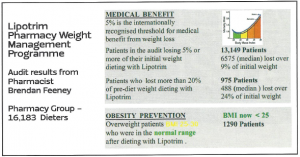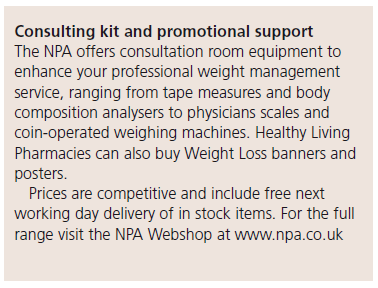S. N. Kreitzman Ph.D. R.Nutr, V. Beeson, S.A Kreitzman Howard Foundation Research Ltd
Obesity is an issue that is now of critical concern to our increasingly overweight society. It is also an area where pharmacists have a real public health contribution to make. Being overweight or obese isn’t a mere cosmetic problem; it greatly raises the risk for other health problems, including High Blood Pressure, Coronary Heart Disease, Type 2 Diabetes. Stroke, Abnormal Blood Fats, Metabolic Syndrome, Cancer, Osteoarthritis, Sleep Apnea, Obesity Hypoventilation Syndrome, Reproductive Problems, Gallstones and more.
At a time when there is increasing competition for over-the-counter sales and decreasing revenue from prescriptions, weight loss offers an area where pharmacists are able to maximise use of their unique skills and training; offering their customers something that simply cannot be purchased from a supermarket or an online retailer. An effective weight loss service is perhaps the single most important contribution pharmacists can make to their community; certainly it is one of the most rewarding – both professionally and financially.
There are now more than 2000 pharmacies in the UK and Ireland offering the Lipotrim weight management service. The results they are achieving are not only comparable to that which can be achieved with bariatric surgery, they are also able to offer a supported programme for weight maintenance obesity prevention- something that is beyond the remit of surgery.
Of particular value is the contribution these pharmacies are making to the treatment of type 2 diabetes, Any patient taking oral mediations for diabetes must, in conjunction with their GP, stop the medication prior to dieting. The blood sugars often normalise within a few days and, with a stone or more weight loss, the diabetes is likely to remain in remission. Excess weight is a major promoter of type 2 diabetes and weight loss is well known to be an effective treatment.
Less dramatic, but equally important is the impact of weight loss on hypertension. It is estimated that in around 50% of cases with high blood pressure, the hypertension is weight related and responds favourably to weight loss.
With the Lipotrim service it is easy to document a pharmacy’s success. Audits can be completed virtually instantly, on demand, and with considerable flexibility. Secure audits can be completed within a single pharmacy or pharmacy group and even for the patients of a single surgery, providing evidence of the value of the service to local doctors.
The NHS is currently engaged in a losing battle against obesity, hypertension and diabetes in UK society. The runaway cost of treating these conditions is on the verge of bankrupting the health service, and still the numbers are trending inexorably in the wrong direction. Pharmacists are having a real impact on this battle by offering an effective alternative to NHS solutions to the problem (medication and bariatric surgery). Lipotrim is a cost-effective and highly successful weight management programme that is demonstrably providing fundamental health benefits for pharmacy customers, and profits for the pharmacies themselves.


PDF Version: infarm nov 2013


